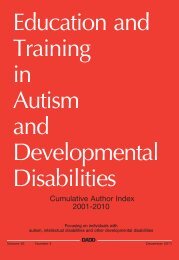etadd_47(3) - Division on Autism and Developmental Disabilities
etadd_47(3) - Division on Autism and Developmental Disabilities
etadd_47(3) - Division on Autism and Developmental Disabilities
You also want an ePaper? Increase the reach of your titles
YUMPU automatically turns print PDFs into web optimized ePapers that Google loves.
ing skills about mathematics <strong>and</strong> deeper c<strong>on</strong>ceptual<br />
underst<strong>and</strong>ing of mathematical ideas<br />
to empower students with knowledge that is<br />
transferable to various situati<strong>on</strong>s rather than<br />
knowledge of procedures specific to certain<br />
mathematical situati<strong>on</strong>s (van Garderen, 2007;<br />
Woodward & M<strong>on</strong>tague, 2002). Mathematical<br />
reas<strong>on</strong>ing <strong>and</strong> c<strong>on</strong>ceptual underst<strong>and</strong>ing can<br />
help students achieve higher levels in mathematics<br />
<strong>and</strong> face increased expectati<strong>on</strong>s for academic<br />
performance in K-12 educati<strong>on</strong><br />
(IDEA, 2004; NCLB, 2002; NCTM, 2000;<br />
Woodward, 2004).<br />
While some might questi<strong>on</strong> the need for<br />
more rigorous focused mathematics educati<strong>on</strong><br />
for students with MID, it is imperative for<br />
multiple reas<strong>on</strong>s: (a) these students are capable<br />
of being successful with these pedagogical<br />
approaches if given a chance (Baroody, 1996;<br />
Jimenez, Browder, & Courtade, 2008; Erez &<br />
Peled, 2001; Neef et al., 2003), (b) a decreased<br />
focus <strong>on</strong> procedures or rote recall is<br />
c<strong>on</strong>sistent with research suggesting students<br />
with MID struggle with working memory<br />
(Schuchardt et al., 2010), <strong>and</strong> (c) helping<br />
these students to be successful <strong>on</strong> high-stakes<br />
assessments (NCLB, 2002; Woodward, 2004).<br />
First, although limited in quantity, the little<br />
research <strong>on</strong> more c<strong>on</strong>ceptual instructi<strong>on</strong> for<br />
students with intellectual disability dem<strong>on</strong>strated<br />
success. Neef et al. taught students<br />
with MID how to use basic algebraic procedures<br />
(e.g., solving for the unknown) while<br />
solving word problems. Related, in a study by<br />
Jimenez et al., students with IQs below 50 were<br />
successful with solving for an unknown in an<br />
algebraic equati<strong>on</strong> (e.g., 3 a 5). These<br />
findings, when c<strong>on</strong>sidered al<strong>on</strong>g with those of<br />
Baroody (1996) <strong>and</strong> Erez <strong>and</strong> Peled (2001),<br />
suggest students with MID possess a number<br />
of skills related to higher order mathematical<br />
underst<strong>and</strong>ing <strong>and</strong> the field may need to raise<br />
its expectati<strong>on</strong>s for what these students can–<br />
<strong>and</strong> should be expected–to do.<br />
Sec<strong>on</strong>d, students with MID struggle with<br />
working memory (Schuchardt et al., 2010).<br />
Rather than focus <strong>on</strong> instructi<strong>on</strong>al approaches<br />
steeped in storage <strong>and</strong> recall, practiti<strong>on</strong>ers<br />
can focus <strong>on</strong> c<strong>on</strong>ceptual underst<strong>and</strong>ing<br />
<strong>and</strong> use technology to circumvent student<br />
struggles (NCTM, 2000; Woodward & M<strong>on</strong>tague,<br />
2002). Students with MID experience<br />
success using calculators (Bouck et al., 2009;<br />
Hort<strong>on</strong>, Lovitt, & White, 1992). Calculators<br />
can be used as a cognitive prosthesis (Edyburn,<br />
2006) <strong>and</strong> teachers can then potentially<br />
devote more instructi<strong>on</strong>al time to developing<br />
a thorough <strong>and</strong> deep underst<strong>and</strong>ing of mathematical<br />
ideas <strong>and</strong> c<strong>on</strong>necti<strong>on</strong>s between those<br />
ideas–instructi<strong>on</strong> c<strong>on</strong>sistent with recommendati<strong>on</strong>s<br />
by NCTM (2000) <strong>and</strong> even special<br />
educati<strong>on</strong> researchers (Woodward & M<strong>on</strong>tague).<br />
Last, higher level mathematical ability <strong>and</strong><br />
underst<strong>and</strong>ing is needed by students with<br />
MID if they are expected to take general largescale<br />
assessment (Bouck, 2007). Given that<br />
students with MID across all grade levels typically<br />
take the same assessment as their peers<br />
without disabilities (Bouck; Yell & Drasgow,<br />
2005; Ysseldyke et al., 2004), instructi<strong>on</strong> in<br />
mathematics for this populati<strong>on</strong> needs to focused<br />
<strong>on</strong> the areas that can promote student<br />
success. If these students are expected to take<br />
the general large-scale assessment, they<br />
should be given general educati<strong>on</strong> academic<br />
instructi<strong>on</strong> to increase the opportunity for<br />
success (Bouck, 2007). While assessment<br />
should not drive instructi<strong>on</strong>al practice<br />
(Faulkner & Cook, 2006; Shepard, 2010), students<br />
with MID have to be given a fighting<br />
chance to be successful by covering the c<strong>on</strong>tent.<br />
Hence, research should focus <strong>on</strong> how to<br />
help students with MID be successful in mathematics<br />
classes if the field of educati<strong>on</strong> c<strong>on</strong>tinues<br />
the practice of high stakes testing.<br />
Implicati<strong>on</strong>s for Practice<br />
The results of this review of the literature<br />
suggest practices exist that assist students with<br />
MID in ascertaining basic facts as well as c<strong>on</strong>ceptual<br />
underst<strong>and</strong>ing of mathematical ideas,<br />
although more research is needed <strong>on</strong> the latter.<br />
Multiple studies in the review suggest<br />
teachers can rely <strong>on</strong> flashcards as an educati<strong>on</strong>al<br />
tool for teaching mathematical facts to<br />
students with MID (Dihoff et al., 2005; Hayter<br />
et al., 2007; Rao & Mallow, 2009; Sante et al.,<br />
2001). However, teachers need to make careful<br />
decisi<strong>on</strong>s about how much time is devoted<br />
to memorizati<strong>on</strong> of facts as compared to critical<br />
thinking about mathematical ideas <strong>and</strong><br />
the c<strong>on</strong>necti<strong>on</strong>s between these ideas (NCTM,<br />
2000; van Garderen, 2007; Woodward & M<strong>on</strong>tague,<br />
2002).<br />
396 / Educati<strong>on</strong> <strong>and</strong> Training in <strong>Autism</strong> <strong>and</strong> <strong>Developmental</strong> <strong>Disabilities</strong>-September 2012

















